|
It's a rare film that is able to grab you by the throat with its opening seconds. Think Sam Fuller's The Naked Kiss or Michael Powell's Peeping Tom, whose opening few shots are startling enough to make you itch to see what follows. So it is with Joseph Losey's Time Without Pity, which begins, to the sort of single high-pitched string instrument scream that would later find favour in 70s horror movies, on a static shot of a painting, from which the camera tilts down just in time to see a woman tumble down the stairs above which the picture is located. The camera then follows the woman as she gets to her feet and backs away terrified, shrouded as she does so by the sinister shadow of her as-yet unseen pursuer. The shot then unexpectedly drifts away from the woman and comes to rest on a sofa and a small table on which a lamp is standing, a lamp that is suddenly jolted to the floor. The woman then falls onto the sofa and the film cuts to a close-up of her now lifeless face, which is why she is unable to respond to the angry male voice commanding her to get up. It's only then that we get to see her killer and realise that while the violence against the woman was clearly intended, her death was probably not. The music builds and the man makes a hasty retreat, and as the camera settles on a second and highly symbolic painting, which is illuminated by the back-and-forth rolling of the fallen table lamp, the main titles unfold. OK, you really have my attention. Please tell me more.
Enter David Graham (Michael Redgrave), who is met as he disembarks at Heathrow Airport by earnest lawyer Jeremy Clayton (Peter Cushing). As they converse, it is quickly revealed that David's son Alec (Alec McCowen) was the boyfriend of the victim Jennie Cole (Christina Lubicz), and due to overwhelming evidence he has been found guilty of her murder and is to be executed the following day. David cannot simply believe that his son could have committed such a crime, but Alec has no memory of the night in question and appears to have resigned himself to a fate he now seems to feel he deserves. Yet from the moment we meet him we know that he's innocent for the simple that we were shown the real killer in the opening scene, and it definitely wasn't him. We thus know that David is correct in his assumption, but are also made aware that the case against Alec is a concrete one. He is thus just twenty-four hours from being put to death for a crime we know he did not commit. What can David possibly do to help?
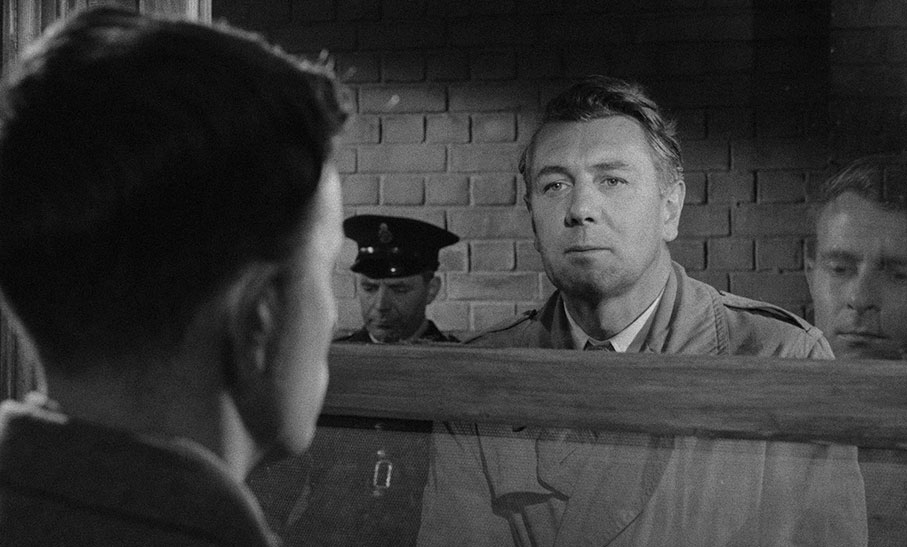
We're clued into the intelligence of blacklisted writer Ben Barzman's screenplay (which was adapted from a play by Emlyn Williams, who is mysteriously not credited) at an early stage by the way it seems to deliver answers to questions almost as soon as you find yourself asking them, only to then to expand on that response. My first question was a fundamental one – why would Alec's father not put in an appearance until just twenty-four hours before his son's execution? Where the hell was he during the trial? The truth emerges in steps during a fraught conversation between David and his son when he visits him in prison. He claims he's been travelling, researching a new novel (it's through this throwaway comment that we discover he is an author by trade), but we soon learn that he has been in a sanatorium drying out from the effects of long-standing alcoholism, and that this is not the first time that he has abandoned his son. It's later confirmed that the sanitorium in question was in Montreal (we can at the very least infer that it was not in England from David's post-title airplane arrival) and that David was prevented from leaving until yesterday and denied access to news and even his own mail during the course of his stay. Not only does this provide a credible reason for his last-minute appearance, but the revelation that Alec himself has started drinking and apparently committed the crime whilst plastered adds another painfully personal layer to David's anguish. It also seems clear from the off that David's recovery is on shaky ground and proves to be a potentially devastating handicap to his investigation, as he is offered tempting drinks by well-meaning others and finds himself slipping into his old ways when he cannot make progress on a case whose every angle has seemingly been pursued by Alec's committed lawyer.
Time Without Pity is in essence a tightly-wound, against-the-clock thriller, but one whose characters, themes and story development enrich it beyond what that simplistic bit of labelling on my part might suggest. At its core is a critique of the then still active (in the UK) practice of capital punishment, reminding us that if you kill a person for a crime that they didn't commit then there is nothing on earth you can do to make matters right. It also explores how alcoholism can be destructive not just to the individual in question but to those closest to them, something evident in the damaging effect it has had on the father-son relationship between David and Alec, something subtly signalled by the simple fact that Alec addresses David by his first name instead of the social standard of 'father' or 'dad'. In the course of the first conversation between them, Alec ruefully recalls being packaged off to a boarding school he hated and David's repeated periods of absence, all of which Alec has previously – and one suspects grudgingly – forgiven his father for. Not this time. It is perhaps ironic that the greatest damage done to their relationship was facilitated in part by David's attempt to finally confront and get on top of his addiction, unaware that the vice had already been damagingly passed onto the son.
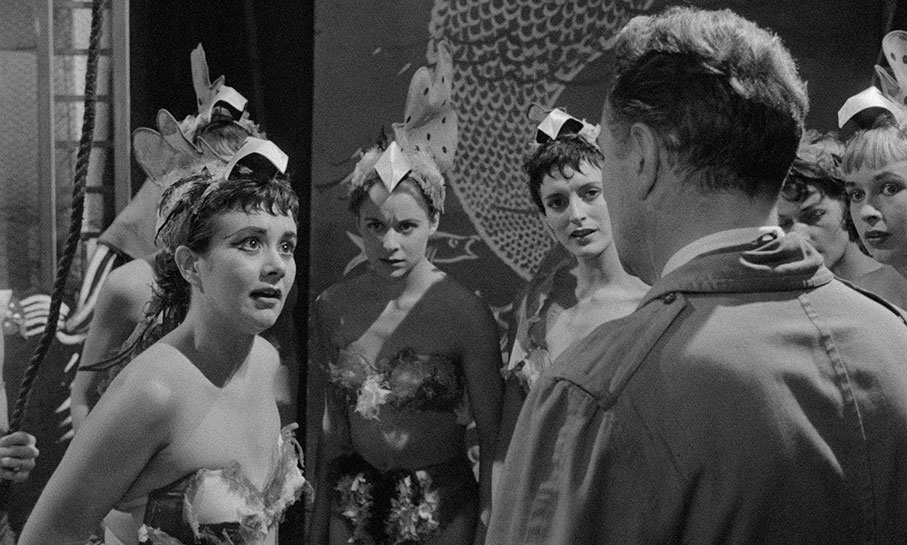
Clayton's heartfelt assurance that all avenues of investigation have been thoroughly pursued makes it clear from the start that David faces an almost impossible challenge if he is to uncover anything that both the police and Clayton's team somehow missed. So determined is he to find a flaw in the case, however, that Clayton suggests he talk to Jennie's sister, Agnes (a young Joan Plowright), and even provides him with her work address. On the surface it looks as through he does this out of sympathy, but it seems more likely that he knows Agnes will have nothing to do with the father of the man who murdered her sister, and hopes that this will help him to realise that the case against Alec really is closed. Yet while the distressed Agnes does indeed angrily refuse to discuss the case with David, her claim that in the days before the murder Jennie came home from a date with Alec covered in bruises convinces David that Jennie was seeing someone else apart from his son, and that he could be the person responsible for her death.
Following this, David drops in on the workplace of successful car company owner Robert Stanford (Leo McKern), who loaned the apartment in which the murder took place to Alec and whose adopted son Brian (Paul Daneman) was Alec's closest friend, and if there's a scene that captures the low-key economy of this film's storytelling, then this is it. In just a few minutes of screen time a lot is communicated without being stated explicitly through dialogue. Just through how they react to David's arrival, we realise that Stanford doesn't know who he is but that Brian does, and that he doesn't want his stepfather to find out, introducing the slightly confused David as a private tutor he has hired to help with his exams. We learn that Stanford has a fractious relationship with his wife Honor (Ann Todd) and that he is quick to anger, and that Honor also doesn't buy into the idea that Alec is guilty and has apparently done what she can to assist him. Most crucially, we instantly recognise Stanford as the one who killed Jennie in the opening scene. The potential solution to David's dilemma is at this point staring David in the face, he just doesn't know it. Then again, even if he did suspect Stanford, there's the little matter of how he could prove it and do so in the dwindling time available.
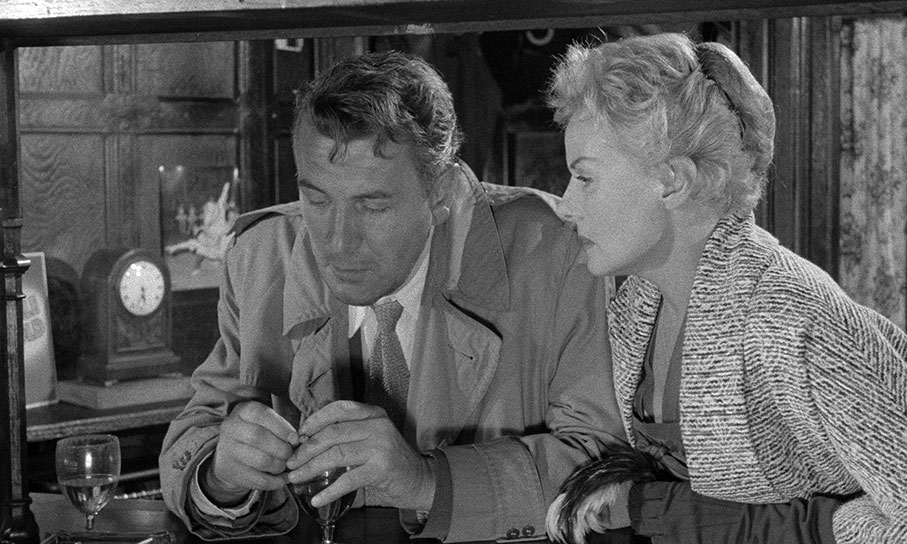
Brian's eventual, friendship-driven willingness to assist David with his search for answers might seem to point the way, but he knows nothing of his stepfather's involvement and the one piece of possibly useful information he is able to suggest is probably back in the sanatorium in Canada. When despair drives David back to drink, however, it's Honor that comes to his aid, her unhappiness at her marriage to the volatile Stanford written in her facial expressions and body language. Her decision to help David is prompted in part by an appearance put in by Stanford's younger secretary-turned-lover, Vicky Harker (Lois Maxwell), who shows up at the flat in which Jennie was killed as David and Brian are discussing the case, having been contacted by Stanford and expecting to find him there. This leads to a lovely exchange that neatly captures the smartly sparky nature of some of the dialogue:
| Brian: |
"He's not here." |
|
| Vicky Harker: |
(self-confident) "He did say it was urgent." |
|
| Brian: |
(irritably) "All right, all right, you've convinced me. You're a devoted Stanford employee." |
|
| Vicky: |
(indignant) "How dare you speak to me like that, Master Brian!" |
|
| Brian: |
"All complaints should be filed through the appropriate channels. |
|
That David might slip into his old ways seems likely from the start, despite his angry refusal of a drink offered Layton after visiting Alec in prison. When he does, the tragedy of his actions is laced with tension over time being wasted while the clock on Alec's life is steadily ticking away. For anyone who has drunk themselves into a stupor (oh, don't get me started) this aspect has particular bite, as we know from personal experience that David's judgment and concentration will be impaired as a result and that the effects cannot quickly be shaken off. Time really is of the essence here, and even when things seem hopeless we know that this is something David simply cannot afford to waste. The first time we see him drinking, he is already smashed by the time Honor locates the pub in which he has installered himself, and after wondering how long he has been sitting at the bar he says something that says so much about the negative effects of alcohol, as the man who just a few minutes of screen time earlier was fighting for his son's life asks drunkenly, "Well, has it happened?"
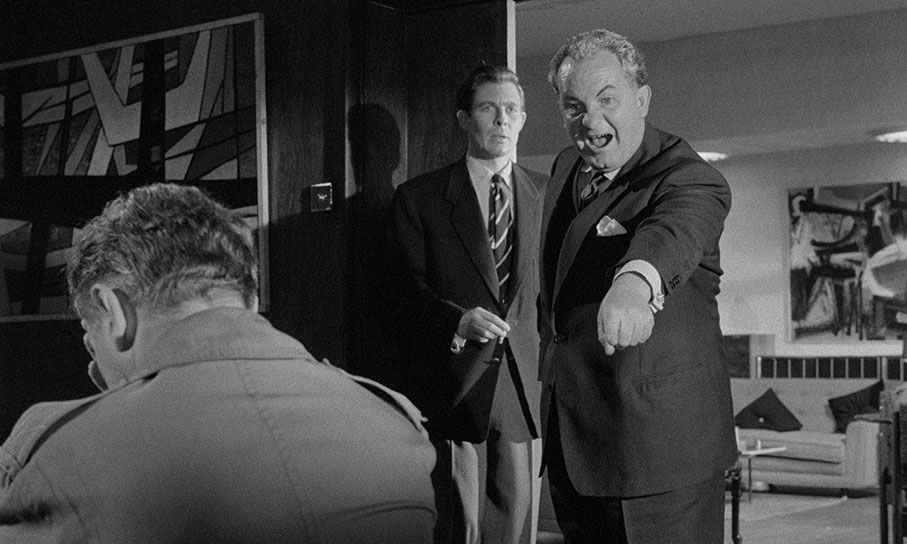
Yet despite his failings and his son's rejection of his offer of help, we're absolutely with David from an early stage. His intentions are honourable and his determination is unshakable, at least when sober, and we care enough about seeing justice done to want to slap him six ways from Sunday when he takes emotional refuge at the bottom of glass. Much of this empathy stems from Michael Redgrave's superb performance as David, one that beautifully captures the twitchy instability of a man drying out and racked with guilt, while his drunken slurs and ramblings are as convincing as any I've seen in a movie for some considerable time. Counterbalancing this is Leo McKern's sometimes ferocious turn as Stanford, a performance I've seen criticised for playing to the gallery but which is absolutely right for the man Stanford is, a bullish, arrogant and volatile businessman who is used to getting his own way and who expects others jump to his every command. We've got one of those in charge of the country at the moment, I believe. Ann Todd does a sterling job of painting Honor as a long-suffering woman who is approaching the end of her tether and who harbours a guilty secret, expertly capturing the character's nervous fragility without ever hammering it home. Paul Daneman, meanwhile, does a solid job as Brian, particularly in the way he communicates his feelings about his stepfather though barely suppressed emotions rather than spoken words, while Peter Cushing's sincerity and precise diction make him perfect casting as the lawyer Clayton.
Time Without Pity was an important film for director Joseph Losey, being the first one on which he was credited under his own name following his blacklisting in McCarthyite America and his subsequent move to England. Losey himself has admitted that his own fury at the world as he experienced it growing up made its way into the film, as does his anger at everything from capital punishment to bureaucratic establishment figures, all of whom here seem to frustrate David's progress, however well-meaning they present themselves. The tension created by the ticking clock on Alec's life and David's time-wasting tumbles into his old ways is sometimes painfully tense, and there are plot developments (which in the spirit of spoiler avoidance I've chosen not to discuss) that more than once change the expected trajectory of the story and the nature of David's repeatedly frustrated investigation. There are times when Tristram Cary's score can feel as if it is punching home points more forcefully than is required, but I'd argue that this is the most consciously expressionistic aspect of the film, and it's counterbalanced nicely by the subtlety with which other aspects are handled (David's move to light a cigarette when visiting Alec is cut short by a small shake of a warder's head, for example). It all builds to a finale that that delivers the sort of gut-punch that I just didn't see coming until about a minute before it occurred, one that could in the right hands make for an interesting kicking-off point for a whole essay on the nature of father-son relationships. It's a powerful conclusion to a consistently gripping film, one driven by its characters, its pacing, its excellent lead performances, its consistently sharp screenplay and the consummate skill and social conscience of its justly acclaimed director.
Another strong 1080p transfer from Indicator, sourced from an HD remaster by Euro London, that is framed in its original aspect ratio of 1.66:1 and displays a consistently strong level of detail and nicely organic film grain. The contrast is well balanced in brightly lit locations and daytime exteriors and is punchy at night, with deep, noir-like shadows that do not swallow picture information in the lit areas of frame. The image is clean, and only in one shot did I detect any trace for former wear as a very slight flickering on the faces of David and Clayton. A very nice job all round. One thing that strong HD transfers do tend to highlight, however, is the fakery of back projection, which is used here for driving sequences and made all the more visible by no changes being made change to the angle on which light falls on faces when the vehicles in question turn corners. Given that this was standard practice at the time, it's easy to live with.
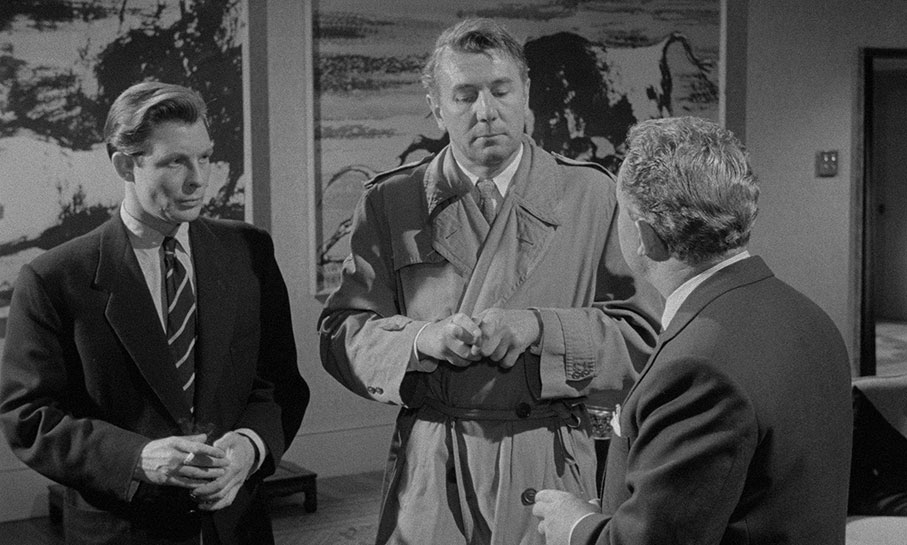
The Linear PCM mono soundtrack has some unsurprising range restrictions but is otherwise robust, particularly in its reproduction of dialogue and Tristram Cary's score.
Optional English SDH subtitles are available.
The Guardian Interview with Joseph Losey (79:28)
Running under the film in the manner of a commentary track, this audio recording of an on-stage interview with director Joseph Losey is a hugely valuable and most welcome inclusion. Subjects covered include his repeated reluctance to helm a remake of Fritz Lang's seminal M, the very different degrees of assistance received from the separate producers of The Prowler and The Dividing Line, the origins of the story of The Secret Ceremony (coming later this month on Indicator Blu-ray), the link between entertainment and social commentary, the re-cutting of his films by others prior to their release, why colour is a lot harder to get right than monochrome, and more. He discusses his collaborations with Harold Pinter, who it turns out is in the audience and at one point even chips in on the discussion. You have to strain a bit to hear him, but he's a little easier to make out than the audience questions, some of which we completely unintelligible to me, though one is described by Losey as "not only vague, but terribly confused." There's some great stuff here, and I did laugh out loud when Losey reveals that he wants to make a film about the Watergate scandal and title it 'The Watergate Buggers'.
Audio Commentary with Film Historian Neil Sinyard
What was originally slated on the press release as a selected scene commentary by the knowledgeable Neil Sinyard has been expanded into one covering the entire film, for which I, for one, am heartily grateful. As ever, Mr. Sinyard mixes background information on the film, its production and its makers with pertinent and well-argued analysis of individual scenes, themes and elements. He discusses how specific sequences were shot (by Freddie Francis, no less), touches on the film's sometimes telling use of reflections, and argues that elements that some complained were overwrought are actually just right for a drama in which an innocent man is due to be wrongly executed in a matter of hours. He highlights and breaks down the qualities of his favourite moments and scenes, and also looks at how the film was received on its release and how it differs from Emlyn Williams' play. There's plenty more to get your teeth into here. Great stuff.
Introduction by Gavrik Losey (15:48)
A newly filmed interview with Joseph Losey's son Gavrik, who as a producer and associate producer also has a string of notable film credits to his name. As the title suggests, he provides an introduction to the film, describing it as a "very good thriller" and highlighting the themes of capital punishment, father-son relationships, and an establishment that is devoid of humanity.
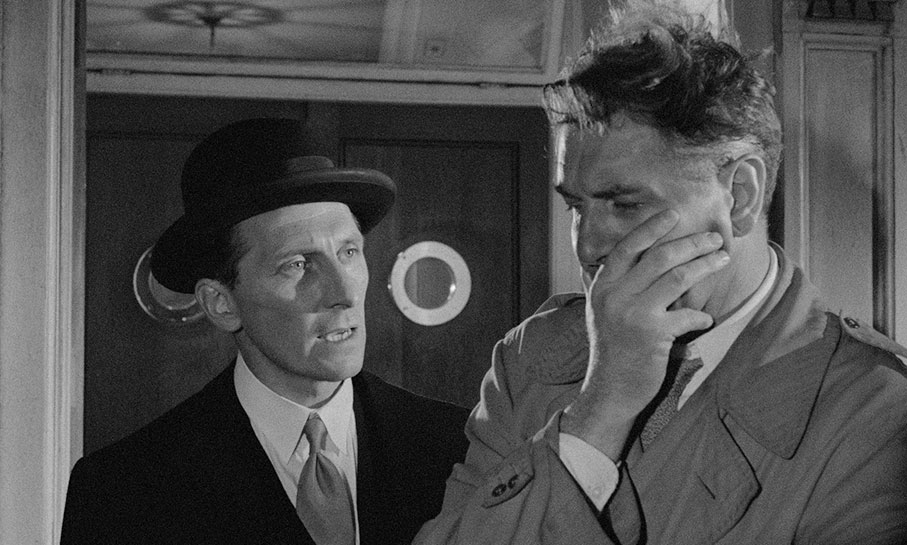
Steven Turner (Horlicks advertisement) (0:34)
Even as someone who firmly believes that all advertising is the Devil's excrement, I acknowledge that directors have to eat and when the feature projects are thin on the ground, sometimes they have to take whatever jobs are on offer. This one, for an unpleasant tasting hot drink that was the punchline of a sleazy joke when I was a kid, was directed by Losey, and while the aim to sell you this crap by bullshitting you is as reprehensible as ever, stylistically it's of genuine interest and inventively odd.
Booklet
Following full credits for the film, this booklet kicks off with a compelling essay on Time Without Pity (and what a good and relevant title that is) by Robert Murphy, who highlights the changes made to the play and sings the praises of Leo McKern's fiery performance, which I heartily second. Next we have extracts from various interviews with Losey in which he discusses the film, its stand against capital punishment and its commentary on men who are tyrants in their own families. Up next is a piece by Jeff Billington on how a disagreement over the qualities of Time Without Pity helped to fuel a growing disagreement between famed French film journal Cahiers du cinéma and the critics who became known as the MacMahonists. I knew nothing of this spat so learned quite a bit from this. Bringing up the rear are extracts from contemporary reviews, and yes, the term 'overwrought' makes an appearance. Press imagery and details of the remaster have also been included.
A gripping, tightly-paced and character-driven thriller with a strong social conscience, excellent performances and enough turns of fate to scupper your chances of predicting where the story will go next. A fine transfer and some excellent special features make this another winner for Indicator. Enthusiastically recommended.
|